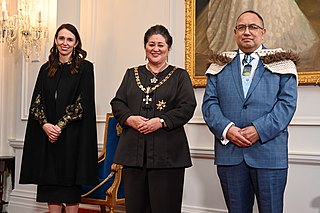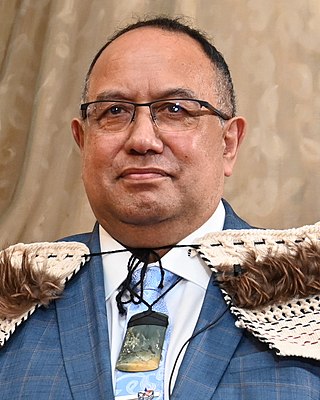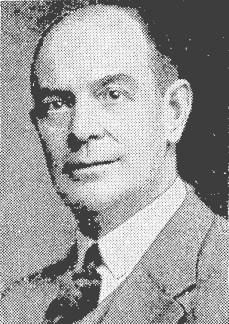
Black Rod is an official in the parliaments of several Commonwealth countries. The position originates in the House of Lords of the Parliament of the United Kingdom. The position is similar to one known as a serjeant-at-arms in other bodies.

The House of Representatives is the sole chamber of the New Zealand Parliament. The House passes laws, provides ministers to form Cabinet, and supervises the work of government. It is also responsible for adopting the state's budgets and approving the state's accounts.

In New Zealand, the speaker of the House of Representatives, commonly known as the speaker of the House, is the presiding officer and highest authority of the New Zealand House of Representatives. The individual who holds the position is elected by members of the House from among their number in the first session after each general election. They hold one of the highest-ranking offices in New Zealand. The current Speaker is Adrian Rurawhe who was elected on 24 August 2022.

Trevor Colin Mallard is a New Zealand politician and member of the Labour Party. First elected to Parliament in 1984, he was Speaker of the New Zealand House of Representatives from 2017 until 2022.

The Order of precedence in New Zealand is a guide to the relative seniority of constitutional office holders and certain others, to be followed, as appropriate at State and official functions. The previous order of precedence is revoked and Her Majesty The Queen approved the following Order of Precedence in New Zealand effective 8 September 2022:
- The King of New Zealand.
- The Governor-General or, while acting in the place of the Governor-General, the officer administering the Government
- The Prime Minister
- The Speaker of the House of Representatives
- The Chief Justice
- The Dean of the Diplomatic Corps
- The Deputy Prime Minister
- Ministers of the Crown
- Former Governors-General
- Ambassadors and High Commissioners in New Zealand and Chargés d’Affaires accredited to New Zealand.
- The Leader of the Opposition in the House of Representatives
- Leaders, including co-leaders and joint leaders, of political parties represented in the House of Representatives, other than Ministers of the Crown.
- Members of the House of Representatives. There is no established order of precedence over members of parliament in general, although each party has its internal ranking.
- Judges of the Supreme Court of New Zealand, the Court of Appeal and the High Court of New Zealand.
- Former Prime Ministers, former Speakers of the House of Representatives, former Chief Justices, and members of the Privy Council.
- Mayors of territorial authorities and chairpersons of regional councils, while in their own cities, districts and regions. In 1989, boroughs and counties were amalgamated into district councils. District mayors, and the Chatham Islands mayor could expect to be accorded this same precedence.
- The Public Service Commissioner, Chief of Defence Force, Commissioner of Police, and Officers of Parliament .
- The Solicitor-General, Clerk of the House of Representatives, and Clerk of the Executive Council when attending a function involving the exercise of the position’s specific responsibilities.
- Chief executives of public service and non-public service departments.
- The Vice Chief of Defence Force, and Chiefs of Navy, Army and Air Force, and other statutory office holders.
- Consuls-General and Consuls of countries without diplomatic representation in New Zealand.
- Members of New Zealand and British orders, and holders of decorations and medals in accordance with the Order of Wear in New Zealand.

The governor-general of New Zealand is the viceregal representative of the monarch of New Zealand, currently King Charles III. As the King is concurrently the monarch of 14 other Commonwealth realms and lives in the United Kingdom, he, on the advice of his New Zealand prime minister, appoints a governor-general to carry out his constitutional and ceremonial duties within the Realm of New Zealand.
The Solicitor-General is the second law officer of state in New Zealand. The Solicitor-General is also head of the Crown Law Office, that comprises lawyers employed to represent the Attorney-General in court proceedings in New Zealand. The current Solicitor-General is Una Jagose.

John Baldwin Munro, better known as J. B. Munro, was a New Zealand politician of the Labour Party. He was also a notable disability advocate.
The Chairman of Committees was an elected position of the New Zealand House of Representatives. The role existed between 1854 and 1992. The roles of the Chairman of Committees were to deputise for the Speaker, and to chair the House when it was in committee. The role is now carried out by the Deputy Speaker. The role of Chairman of Committees also existed for the Legislative Council.

Adrian Paki Rurawhe is a New Zealand Labour Party politician of Ngāti Apa descent. He is the speaker of the New Zealand House of Representatives, the second Māori to hold the position, and Member of Parliament for Te Tai Hauāuru.
James Coates was a prominent pioneer settler of Auckland, New Zealand. He was also a senior official within the administration of the newly-established colony of New Zealand, following the proclamation of sovereignty by William Hobson and the signing of the Treaty of Waitangi in 1840.

Charles Philip Littlejohn was the eleventh Clerk of the New Zealand House of Representatives. As Clerk of the House he was head of the Legislative Department, responsible for administrative services to Parliament prior to the creation of the Parliamentary Service in 1985 and the Office of the Clerk of the House of Representatives in 1988.
David Martin Wilson is the fourteenth and current Clerk of the New Zealand House of Representatives. His first seven-year term as Clerk of the House began on 6 July 2015, following the retirement of Mary Harris In May 2022, he was reappointed for a further seven-year term, beginning on 6 July 2022.

Mary Winifred Harris was the thirteenth Clerk of the New Zealand House of Representatives. She was appointed Clerk of the House on 10 December 2007, following the resignation of David Graham McGee. She served as Clerk of the House for 7 years and 7 months before retiring on 5 July 2015.

Grafton Francis Bothamley was the eighth Clerk of the New Zealand House of Representatives. As Clerk of the House he was head of the Legislative Department, responsible for administrative services to Parliament prior to the creation of the Parliamentary Service in 1985 and the Office of the Clerk of the House of Representatives in 1988.
Eric Alwyn Roussell was the tenth Clerk of the New Zealand House of Representatives. As Clerk of the House he was head of the Legislative Department, responsible for administrative services to Parliament prior to the creation of the Parliamentary Service in 1985 and the Office of the Clerk of the House of Representatives in 1988.

Major Francis Eastwood Campbell was the second Clerk of the New Zealand House of Representatives, serving for 35 years from 1854. An unusual aspect of Campbell's tenure as Clerk of the House was that for the last 21 years that he held this office he also served as the Clerk of Parliaments, an office traditionally reserved for the clerk of the upper house in a Westminster parliamentary system.
George Friend was the third Clerk of the New Zealand House of Representatives, serving in this office for 9 years from 1889. He held positions in the New Zealand public service and Parliament for 45 years until his death at 63 years of age.
Parliamentary Debates (Hansard) is the official name of the transcripts of debates in the New Zealand Parliament. New Zealand was one of the first countries to establish an independent team of Hansard reporters, 42 years before the British (Imperial) Parliament. An official record of debates has been kept continuously since 9 July 1867. Speeches made in the House of Representatives and the Legislative Council between 1867 and the commencement of Parliament in 1854 were compiled in 1885 from earlier newspaper reports, and this compilation also forms part of the New Zealand Hansard record.

The secretary of the Cabinet is a senior public servant in New Zealand. The Cabinet secretary usually serves concurrently as the clerk of the Executive Council. The secretary is responsible for the impartial recording of Cabinet decisions, and as clerk of the Executive Council they are also a liaison between the Cabinet and the governor-general. The secretary is also responsible to Cabinet as a collective for ensuring the confidentiality of Cabinet proceedings, and the impartial and effective operation of the Cabinet system. The current Cabinet Secretary and Clerk of the Executive Council is Rachel Hayward.





















